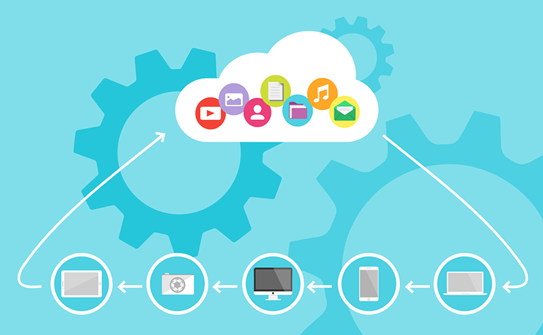Benefits of Cloud Computing for Entrepreneurs & Freelancers
Cloud computing is the delivery of computing services over the internet, allowing users to access and use technology resources (such as servers, storage, databases, networking, software and analytics) without having to own or manage physical hardware or infrastructure. Simply put, cloud computing is like renting a powerful computer or storage space on the internet instead of buying and maintaining your own.
Imagine you have a computer at home, but it’s limited in power and storage. Instead of keeping everything on that computer, you can use the internet to access a bigger, more powerful computer somewhere else. Let’s make it more relatable, if you use an iPhone, you are very much aware of “iCloud’’, that’s exactly what cloud computing is — like renting a garage to store your stuff instead of keeping it in your own small closet.
Entrepreneurs and freelancers work independently, but their roles and the way they work are slightly different.
Learning cloud computing can offer numerous benefits for entrepreneurs and freelancers. Here’s how it can significantly impact their businesses and careers:
Cost Efficiency
Cloud computing reduces infrastructure costs and eliminates the need to invest in expensive hardware and IT infrastructure. Entrepreneurs and freelancers can use cloud services on a pay-as-you-go model, which is cost-effective compared to maintaining physical servers. It also offers scalable resources, meaning you can start small and expand as needed, keeping costs manageable and avoiding overinvestment in infrastructure.
Increased Productivity
Cloud computing fosters remote working. It allows access to files and software from anywhere. Entrepreneurs and freelancers can work from home, office spaces or while traveling, making them more flexible and productive.
With tools like Google Workspace, Microsoft 365 and other cloud-based applications, team communication becomes seamless. Entrepreneurs can share documents, manage projects and communicate with remote teams in real-time.
Enhanced Data Security
Cloud computing guarantees backup and disaster recovery. The providers often offer backup services, meaning important business data is safe and accessible even in case of hardware failures. This reduces the risk of losing critical data due to technical issues.
Reputable cloud providers implement strong security measures, such as data encryption, ensuring that sensitive business information is protected. For entrepreneurs dealing with client data, this offers peace of mind.
Access to Advanced Technologies
Cloud platforms provide access to advanced tools like artificial intelligence and machine learning without requiring large investments. Entrepreneurs can leverage these technologies to improve decision-making, automate processes, and offer innovative services.
In relation to bid data, cloud services offer vast storage capacity and the tools necessary for analysing big data, which can help entrepreneurs gain valuable insights about their business operations or customer behavior.
Flexibility & Scalability
Cloud resources can be scaled up or down based on business needs. For example, if a freelancer or entrepreneur faces an influx of work, they can quickly add more computing power or storage and scale back when the demand decreases. The cloud also offers a global network of servers, which means entrepreneurs can serve clients from all over the world with low delay and fast access to services.
Time-Saving Automation
Cloud computing offers tools that automate routines, processes and tasks like file backups, software updates, invoices and reporting. This saves entrepreneurs and freelancers a lot of time, allowing them to focus on core business activities.
Cloud-based systems integrate easily with other software, helping streamline processes and improve overall efficiency. For instance, integrating accounting software with project management tools can automate invoicing and track expenses.
Improved Customer Experience
Cloud-based applications and services are typically available 24/7, ensuring that entrepreneurs can meet client needs at any time, enhancing customer satisfaction and loyalty. With cloud computing, businesses can provide faster and more reliable services to their customers. From website hosting to customer support, cloud services enhance the overall user experience.
Collaboration and Networking Opportunities
Many cloud platforms, like AWS, Microsoft Azure and Google Cloud, have vibrant communities where entrepreneurs and freelancers can connect, share knowledge and find solutions to problems. Cloud computing allows small businesses to collaborate with larger organisations and even integrate with their services, giving way to networking and partnership opportunities.
Competitive Edge
By adopting cloud computing, entrepreneurs and freelancers can remain competitive in their respective fields. Many industries are moving towards digital and cloud-based services and being familiar with these technologies can position individuals as leaders in their niche. Cloud platforms allow for rapid prototyping and testing of new ideas, giving entrepreneurs the agility to innovate without investing heavily in new infrastructure.
Sustainability
By using cloud computing, businesses can reduce their carbon footprint. Cloud data centers are often more energy-efficient than individual businesses maintaining their own servers, leading to a more sustainable approach to computing.
In summary, learning cloud computing equips entrepreneurs and freelancers with tools to optimise their operations, reduce costs, improve flexibility and stay ahead in a competitive marketplace. By mastering cloud platforms, you can unlock a world of possibilities to scale your business, enhance productivity and provide better services to your clients.

